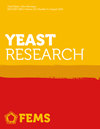投稿信息
稿件收录要求
The leading journal in its field, FEMS Yeast Research bridges the gap between pure and applied research on conventional and non-conventional yeasts and yeast-like organisms.
2019 Impact Factor: 3.193, Journal Citation Reports (Source Clarivate, 2020)
Ranking 2019: 8/29 (Mycology); 58/135 (Microbiology); 61/156 (Biotechnology & Applied Microbiology)

Scope of the journal
FEMS Yeast Research offers efficient publication of high-quality original Research Articles, Mini-reviews, Letters to the Editor, Perspectives and Commentaries that express current opinions. The journal will select for publication only those manuscripts deemed to be of major relevance to the field and generally will not consider articles that are largely descriptive without insights on underlying mechanism or biology. Submissions on any yeast species are welcome provided they report results within the scope outlined below and are of significance to the yeast field.
- Articles must contribute to improving our understanding of the biology or impact of yeasts.
- Topics that are relevant include physiology, biochemistry, molecular biology, signalling, genetics, genomics, systems biology, synthetic biology, metabolic engineering, biodiversity, molecular diagnostics, industrial applications, yeast pathogenesis, fermentation and biotechnology.
- Articles that use yeast as a model organism for studying human diseases or that study general biological phenomena of broad interest
- New methods and protocols of wide relevance to the yeast community
The following types of articles are not generally considered
- Straightforward descriptions of new yeast species
- Survey-type studies that cultivate, describe and provide only preliminary characterisation of yeasts from a particular habitat (e.g. food, environmental or clinical)
- Papers that report phenomenon or phenotypes without addressing underlying mechanisms. This includes studies that report the effects of extracts, drugs, chemicals, reagents and environmental conditions on yeast but do not determine the basis of these effects.
- Papers that provide confirmatory evidence or merely extend observations firmly established in one species, field site or biological context to another.
- Studies that mainly re-analyse existing mutants (e.g, from collections) for new phenotypes but do not follow-up with deeper analysis
- Clinical case studies
- Straightforward heterologous expression studies – e.g. expression of a particular enzyme of biotechnological interest but no particular innovation
- Solid papers that are scientifically sound but do not significantly advance knowledge or application of yeasts
Discover the most cited, most downloaded, and top Altmetric scoring articles from FEMS Yeast Research in the Articles with Impact Collection.
Editorial Policy
FEMS Yeast Research will only consider articles that are within the published scope of the journal, are original submissions, are not preliminary or incomplete, and are of significance the field of yeast research. The Editor-in-Chief or Editors will reject papers, with an immediate decision, that are outside the scope of the journal, lack significance, or which they believe do not meet the required standards for other reasons. Retained papers will be assigned a handing Editor who will make decisions on acceptance, revision, resubmission or rejection based on independent referees’ reports. All manuscripts will be reviewed by at least two qualified members of the Editorial Board or other appropriate experts. Authors who feel that there are substantial grounds for disagreement with an Editor’s decision should contact the Editor in Chief, whose decision will be final. Details of the journal Editors and Editorial Board are available on the journal website.
Abstracting & Indexing services:
Abstracts in Anthropology (Baywood Publishing)
Academic Search (EBSCO Publishing)
Academic Search Premier (EBSCO Publishing)
AGRICOLA Database (National Agricultural Library)
BIOBASE: Current Awareness in Biological Sciences (Elsevier)
Biological Abstracts (Thomson Reuters)
BIOSIS Previews (Thomson Reuters)
Biotechnology Citation Index (Thomson Reuters)
CAS: Chemical Abstracts Service (ACS)
CSA Biological Sciences Database (ProQuest)
CSA Microbiology Databases (ProQuest)
Current Contents: Agriculture, Biology & Environmental Sciences (Thomson Reuters)
Embase (Elsevier)
InfoTrac (GALE Cengage)
Ingenta Select
Journal Citation Reports/Science Edition (Thomson Reuters)
MEDLINE/PubMed (NLM)
PubMed Dietary Supplement Subset (NLM)
Science Citation Index Expanded (Thomson Reuters)
Viticulture & Enology Abstracts (Vitis)




